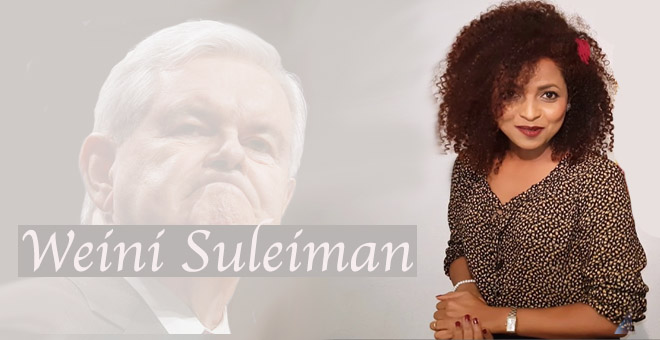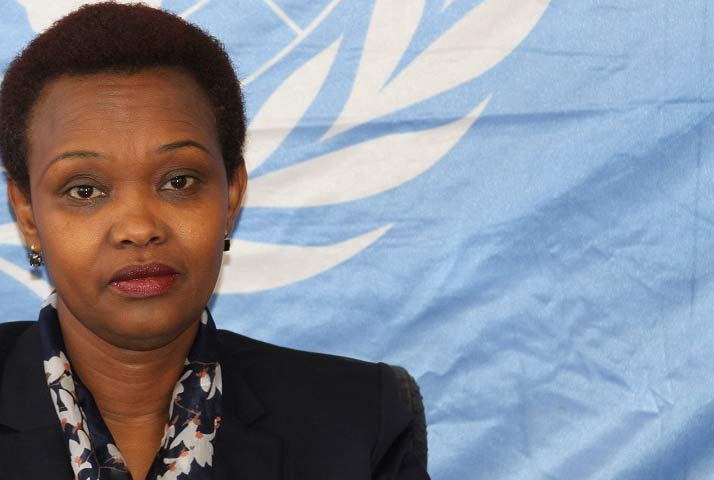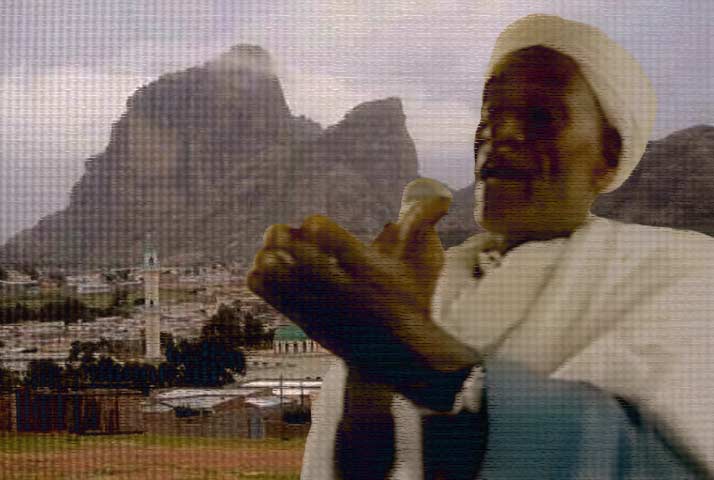Building Democracy And Democratic Institutions In Eritrea
 (This is a speech presented at the Eritrean Civic Society Public Meeting organized by the People’s Committee for National Congress of Greater Los Angeles, CA, February 19, 2011. Dr. Afeworki Paulos teaches African politics and International Relations at Carnegie Mellon University. In addition to his teaching, he also serves as Assistant to the Dean of Libraries and Social Sciences Librarian.)
(This is a speech presented at the Eritrean Civic Society Public Meeting organized by the People’s Committee for National Congress of Greater Los Angeles, CA, February 19, 2011. Dr. Afeworki Paulos teaches African politics and International Relations at Carnegie Mellon University. In addition to his teaching, he also serves as Assistant to the Dean of Libraries and Social Sciences Librarian.)
I would like to thank the organizers of the panel discussion for the invitation. I was asked to give a presentation on this important topic about a week ago. The topic requires more than a week to prepare a well- researched paper. In my brief presentation I will raise some pertinent issues to the topic at hand. Hopefully, during the question and answer session some of the issues will be discussed further. The issues are: citizen’s fundamental rights; representation/peoples’ will; political elite/organizations; religion, region and language issues and finally I will say a few words about the national congress.
Citizen’s Rights
The Eritrean people struggled for over a century for their political and civil rights. Indeed, a few years after the Italians established colonial rule, there were rebellions against the colonial policies. When the Italian forces were defeated during World War II, Eritreans got an opportunity to debate the fate of their country. Unfortunately, internal divisions and the involvement of external forces detracted from the development of a full-fledged nationalist movement. Moreover, the federal arrangement that was established by the United Nations put Eritrea in a precarious situation – having a democratic constitution on the one hand and federated with Ethiopia under an emperor who ruled a feudal order on the other. The 1952 Eritrean Constitution (the federation era) guaranteed fundamental rights including – rights to freedom of opinion and expression; the right to freedom of peaceful assembly and association (article 22); freedom of conscience and religion (article 26) and other fundamental rights.[i]
The 1952 Constitution, although ratified by the elected Eritrean Assembly, was prepared by an external entity. The constitution also had weaknesses including the exclusion of women in voting rights. Furthermore, the constitution itself was at the mercy of the emperor. The Ethiopian emperor and his supporters in Eritrea marshaled their forces to undermine the fundamental rights that were enshrined in the constitution. The erosion of fundamental rights and repressive measures narrowed the political sphere for peaceful resistance. Thus in the early 1960s an armed struggle started. This takes me to my second issue – political organizations and political elites
Political Organizations and Political Elites
In the 1940s and 1950s political organizations in Eritrea mobilized their supporters by religion and region mostly. Political parties such the Muslim League and Unionist Party were sectarian. There were other smaller parties such as the Liberal Progressive Party that attempted to mobilize supporters based on united national sentiment. The prevailing division was exploited by the Ethiopian emperor and his cohorts in Eritrea. Fundamental rights were violated. As Lloyd Ellington put it:
“The democratic principles of the Eritrean Constitution established by the United Nations were gradually eroded” [ii]
Peaceful resistance against the forces of Emperor Haile Selassie was futile. Eritrean politics took a different route – armed resistance. But armed struggle started when the political elite in Eritrea was still fractured. The politics of region and religion were sources of the appeal to organize political organizations. The lack of tolerance, trust of each other and unsettled issues of religion, language and region in the political discourse were reflected in the incipient armed nationalist movement. Politics of compromise was not highly prized in the 1940s and 1950s and it simply eroded further during the period of armed struggle. Political differences were settled on zero-sum bases – no more than one organization in the Eritrean field, reactionary versus progressive demonization became the mantra of the leaders. But the highly divided leaders of the liberation movements effectively used Marxist ideology to mobilize the youth, peasants, nomads and other sectors of the society under the banner of “victory to the masses”. The role of foreign ideology in the mobilization process and in uniting the rank and file of fighters and in masking the uncompromising attitude of the leadership of the nationalist movement cannot be underestimated. But once independence was achieved the masses did not participate in the decision making of the country’s affairs. The Eritrea people were denied the fundamental rights that the 1952 Eritrean Constitution provides. The unsettled issues of religion, region and languages surfaced.
Post-independence Era
In independent Eritrea, the expectation of many and certainly the Eritrean masses that paid a heavy price in the name of independence and peoples’ rights, was that the Eritrean citizen would have fundamental political and civil rights and the right to participate in their country’s political decision making. The Eritrean people were promised a democratic constitution. A Constitution Commission was formed. Let us examine the constitution- making process and the 1997 Eritrean Constitution briefly.[iii]
In November 1997, as a discussant at a panel at the African Studies Association meeting in Columbus, Ohio, I raised the following issues:
Political Stability – I said “initially the EPLF leadership talked about open political system including multiparty system – then slowly stability was defined in terms of non-party politics. The 3rd Congress (February 1994) of the EPLF, was not enthusiastic about party politics to put it mildly.”
On Constitution Commission, I said “the constitution commission did not include opposition groups, no political parties were allowed to participate in the constitution- making process- media was state controlled. The constitution- making process was controlled and state dominated.”
I also raised several issues of the 1997 Constitution including the constitution’s articles regarding the state and language issues. I concluded that the 1997 Constitution gives the state a prominent positive role. Article 6 (3) states that the “State shall ensure peace and stability by establishing appropriate institutions that encourage people’s participation and by creating the necessary condition capable of guaranteeing, hastening and engendering equitable economic and social progress” Article 7(6) states that the “State shall create the necessary conditions for establishing a democratic, political culture …” and I rejected this. I said that “trust should rest on the shoulders of the Eritrean citizen not the state”
That is what I said in 1997. My concern then and now is that the post-colonial state in Africa is known for its violation of democratic rights and not in promoting them. As Robert Bates put it:
“During the struggle for independence, Africa’s citizens had embraced politics. In response to the political realities about them, however, in the post-independence era, they increasingly came to view their leaders as a source of insecurity and the state as a source of threat rather than of well-being.”[iv]
That is what we have in Eritrea. A state that abuses its citizens. A state that is exclusionary. A state that does not permit freedom of association. Because of this political reality opposition political parties are based outside Eritrea (with few exceptions that are engaged in armed resistance). The opposition parties lack ideology. They gain their support like many African political parties “on the basis of personal and ethno-regional appeals”[v]
The political organizations base their appeal some by region (Afar, Kunama), others by religion and some still hinge on the old liberation front era rivalry. We don’t have a socialist party, labor party, or peasant/farmer party.
The authors of the “Eritrean Covenant” and “Eritrean Accord” raise issues of religion, language and region. Although I reject some of the assertions and conclusions of the Mejlis Ibrahim Mukthar group[vi] (council) the two documents – raise some pertinent issues that need to be addressed if we are to have an inclusive, peaceful and democratic Eritrea. The Mejlis group assert that Muslims in Eritrea “have their own unique and specific concerns” and Muslims are “suffering persecution, de facto exclusion, institutionalized discrimination and systematic disfranchisement” and Muslims are “treated as second class citizens by the ruling clique in their own country” and demand the end of the “process of Tigrignization of the state” and appeal to Muslims to assert their “ Islamic identity”
These are serious issues and any meaningful debate about the future of Eritrea has to address these concerns. In Eritrea Muslims and Christians have coexisted for centuries. Post-independence Eritrean politics has not been conducive to sustaining this centuries old peaceful coexistence between Muslims and Christians. The problem emanates not only from the repressive state in Eritrea but also from the overall orientation of political leadership including those in the opposition. Indeed the behavior of the political elite in the Horn of Africa of the last fifty years gives little optimism in this regard. In the words of Donald Crummey, a historian of the Horn:
“The politics in the Horn has been dominated by self-constituted elites … that they possess special insight, resolve, and skill – that they have the right answers … to the problems afflicting their peoples or nations, and all others, especially their rivals, have the wrong answers.”[vii]
In Eritrea, zero-sum politics is exercised by both those who control the state and those who oppose the state. I discussed the Mejlis Ibrahim MuKhtar documents earlier. The authors raised the concern of Muslims and expressed their wish for peaceful coexistence with their Christian compatriots. But the perception of the Mejlis Ibrahim Mukhtar group regarding their rival political elites is not different from other political elites in the Horn. The Mejlis group wrote:
“the history of the unrepresentative and tiny Kebessa elite, from the federation era up to now, can be characterized by careerism, opportunism, self-promotion and a quest for personal advancement at any cost. Now it is finding itself, albeit belatedly, consistently in the wrong side of history”
These are not words that inspire coexistence, reconciliation, tolerance and compromise. For that I think we need to learn from the ordinary Muslims and Christians that have coexisted in Eritrea.
Peaceful coexistence, respect of traditions and religions of the different groups in Eritrea have to be addressed if peace and democracy is to prevail in Eritrea. The 1997 Constitution is silent on group rights. The 1952 Constitution addresses group rights. Article 36 states that “Nationals of the federation … shall have the right to respect for their customs and their own legislation governing personal status and legal capacity, the law of the family and the law of succession”
Other African countries’ constitutions have also recognized group rights and customary laws. The Ghanaian constitution recognizes institutions of chieftaincy and traditional councils. The South African constitution recognizes traditional authorities and indigenous law.
In terms of representation at the national level, we can learn from the ingenious constitution of Mauritius. The constitution reserves 8 parliamentary seats to the “best losers” (best losing candidates) from underrepresented groups.
A constitution has to protect the fundamental political and civil rights of the Eritrean citizen, limit the power of the state, protect group and religious rights, and lay the foundation of political structure that guarantees the will of the people. But declaration of formal political structures and political institutions is not sufficient by itself. A political culture of tolerance, inclusiveness, and compromise is needed to address the issues that the nation is confronted with. The South Africans succeed in overcoming their deep-seated differences and hostility during the constitution-making process (Convention for Democratic South Africa, CODESA; and the Multiparty Negotiating Process, MPNP).
The African National Congress (ANC), the National Party (Afrikaner), Inkatha Freedom Party and others negotiated successfully to overcome their differences and hostility and came out with one of the most progressive constitutions in the world. I say we can overcome our differences.
Now let me say a few words about the National Congress.
National Congress
Ideally a national congress should be held in Eritrea. But the political reality simply does not allow that. A national congress should be open to all stake holders. A national congress that is being held outside Eritrea can only be an interim and transitional one. A national congress can proceed with the above caveat and makes no presumption in representing interests of the entire Eritrean population.
Thank you.
References
[i] Constitution of Eritrea, 1952. Final Report of the United Nations Commissioner in Eritrea, General Assembly Official Records: Seventh Session Supplement No.15 (A/2188), 76-89
[ii] Ellington, L. 1978. “The Origins and Development of the Eritrean Liberation Movement” in R. Hess ed., Proceedings of the Fifth International Conference on Ethiopia, Chicago, 613-625
[iii] 1997 Eritrean Constitution (draft) available at http://www.shaebia.org/constitution.html Ratified version at http://unpan1.un.org/intradoc/groups/public/documents/un-dpadm/unpan040909.pdf
[iv] Bates, R. 2008. When Things Fell Apart. Cambridge University Press
[v] Van de Walle, N. 2003. “Presidentialism and Clientelism in Africa’s Emerging Party Systems”, Journal of Modern African Studies, 41, 2, 297-321
[vi] Mejlis Ibrahim Mukhtar. 2010. “The Eritrean Covenant” Available at http://www.awate.com/portal/content/view/5491/11/ Mejlis Ibrahim Mukhtar. 2010. “The Eritrean Accord” Available at http://www.awate.com/portal/content/view/5667/11/
[vii] Crummey, D. 2003. “The Horn of Africa: Between History and Politics”, Northeast African Studies, 10, 3 (new series), 117-138




Awate Forum